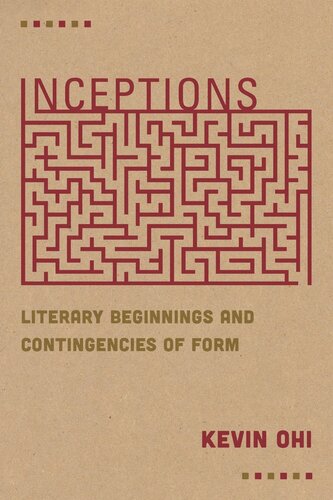

Most ebook files are in PDF format, so you can easily read them using various software such as Foxit Reader or directly on the Google Chrome browser.
Some ebook files are released by publishers in other formats such as .awz, .mobi, .epub, .fb2, etc. You may need to install specific software to read these formats on mobile/PC, such as Calibre.
Please read the tutorial at this link: https://ebookbell.com/faq
We offer FREE conversion to the popular formats you request; however, this may take some time. Therefore, right after payment, please email us, and we will try to provide the service as quickly as possible.
For some exceptional file formats or broken links (if any), please refrain from opening any disputes. Instead, email us first, and we will try to assist within a maximum of 6 hours.
EbookBell Team

4.0
26 reviewsThe beginning is both internal and external to the text it initiates, and that noncoincidence points to the text’s vexed relation with its outside. Hence the nontrivial self-reflexivity of any textual beginning, which must bear witness to the self-grounding quality of the literary work— its inability either to comprise its inception or to externalize it in an authorizing exteriority. In a different but related way, the fact that they must begin renders our lives and our desires opaque to us; what Freud called “latency” marks not only sexuality but human thought with a self-division shaped by asynchronicity.
From Henry James’s New York Edition prefaces to George Eliot’s epigraphs, from Ovid’s play with meter to Charles Dickens’s thematizing of the ex nihilo emergence of character, from Wallace Stevens’s abstract consideration of poetic origins to James Baldwin’s, Carson McCullers’s, and Eudora Welty’s descriptions of queer childhood, writers repeatedly confront the problem of inception. Inception introduces a fundamental contingency into texts and psyches alike: in the beginning, all could have been otherwise.
For Kevin Ohi, the act of inception, and the potential it embodies, enables us to see making and unmaking coincide within the mechanism of creation. In this sense, Inceptions traces an ethics of reading, the possibility of perceiving, in the ostensibly finished forms of lives and texts, the potentiality inherent in their having started forth.
This is the only book to address a central literary question: beginning, or what the book calls inception. As a conceptual problem (not just a practical one), ending has received distinguished treatment by thinkers worthy of it. Finally, beginning receives the like consideration.